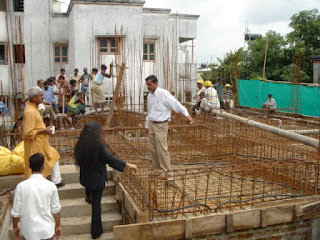

Surendran and I built a house recently which was a humbling experience in learning how ill-informed we are regarding the skills and artistry of our labourers, and how we rarely acknowledge or appreciate their contributions to architecture, leaving this area of credit vacant and disregarded. There are thousands of faceless people who build our cities and bring the comfort of luxurious lifestyles to appease our fantasies and create infrastructures to the process of development that benefits us, but who exist most often on the footpaths, hiding in the shadows of their own achievements with little else than a plastic sheet as the canopy to adorn their homes.
Though I designed the architectural plan of the house, there was no way in a million years that I could have build this home, brick by brick, as it was done, without the detailed abilities that each of these workers brought to the project as they literally built it with the toil of their sweat, in climatic conditions that are exhaustive and relentlessly harsh. My labourers: the sand carriers, the masons, the carpenters, the polishers, the stone cutters, the plumbers, the electricians, the fabricators and all the numerous technicians gave articulation to the concept and breathed life into defining this space we call our home.
The saddest thing is that we label most of these amazingly talented and enormously creative people as "unskilled", because we have structured an elitist hierarchy which views qualifications from sanctioned institutions, as being the only emblematic yardsticks of recognition for merit and ability. That millions of people in India do not even have the opportunity of choice to a basic education makes this parameter questionable, and suggests that our vision of development has been derailed where it is most essentially required.
With farming increasingly becoming less attractive to the youth of rural India due to the tragic plight it has come to be identified with in recent years, economic necessity is forcing the inhabitants of villages to be lured by the promises that cities seduce them with in order to survive. That we then compromise the dignity of this work-force by abusing their civil rights so blatantly by preying upon their crisis to benefit our situations, is never addressed or even admitted to. The builders are a ruthless business community who refuse to create any organised sector for this work force, because to do so would mean that health care and life insurances for these workers would become mandatory, and child labour a punishable offence.
Pregnant women carry loads of material at a time when their bodies are already overloaded and need care. Accidents on site are a common factor as safety regulations get flaunted in the most care-a-damn manner. Hygiene and basic amenities such as toilets and access to clean water are never a consideration.
I was lucky that the home we built adjoins the flat we own, and so I could partake of the lives of those working on our site during the span of a year and a half, and forge intimate relationships with them that included knowing them personally and not only communicating with them over work related issues. Beautiful people each of them, they have left their spirits in our home in ways that bring back memories of them everyday for me. Nomads they travel from one location to another building homes to house the dreams of others. Look into their eyes the next time you work with a migrant labourer, because there too lies a dream that has the desire to be realised; only our selfishness is the barrier that prevents this happening.
No comments:
Post a Comment